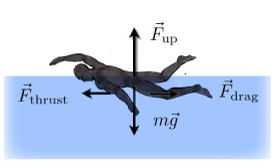|
THE GOLD BLEND: SCIENCE
Honors Physics with Lab
Principles of mechanics
 Physics is the study of forces acting on matter, and though we seldom realize it, physics is an integral part of our everyday lives. When we drive a car, open a can of soda, turn on a blender, or even just take a walk outside, forces are at work, acting on matter. Physics is the study of forces acting on matter, and though we seldom realize it, physics is an integral part of our everyday lives. When we drive a car, open a can of soda, turn on a blender, or even just take a walk outside, forces are at work, acting on matter.
Yet analyzing and comprehending those forces is often fraught with difficulty, the concepts seeming unclear or even indecipherable. The laws of physics can often seem counterintuitive: how is it that two objects of different masses fall at the same rate? — Or when a ball is thrown, why does it start falling immediately — as opposed to traveling horizontally for a while and then starting to fall?
Prerequisites
Students new to The Blend may be required to take our math and reading assessments before being admitted to this course. In particular, students must have completed Algebra II — specifically, the student must be able to properly manipulate algebraic expressions.
Partly in reaction to the difficulty of physics concepts, high school and even college physics courses often "teach" the content by requiring that students memorize and apply formulas. Students who are whizzes at math or good at memorization do well in such classes; the rest are left confused.
Honors Physics at The Blend takes a different approach. Our students always begin by experiencing for themselves specific physical phenomena and understanding their underlying principles. Then and only then do they delve into the mathematical conceptualization of those principles and their algebraic applications.
 For our students, this approach has two principal benefits: For our students, this approach has two principal benefits:
- The beauty, logic, and elegance of the physical world are obvious.
- So are the formulas.
So in Honors Physics the students perform experiments and activities primarily to explore mechanics. — Here's a partial list of the topics explored in this course:
| EXPLORING MECHANICS |
- Analysis of Data
- Vectors
- Kinematics (motion) in one direction
- Kinematics in two directions
- Energy, Work and Power
- Dynamics: Newton's Laws of Motion
- Momentum
- Gravity
- Circular Motion
|
| EXPLORING ELECTRICITY |
- Electrostatics
- Electric Potential
- Electric Fields
- DC Circuits
|
Would you like more information? — To learn more or attend an Open House, please write to us at info@hscollegebound.com.
|
|
|
Our approach to ...
Science
Sciences at The Blend aim high. At the same time, we provide in-depth studies of the discipline for two kinds of students:
- those new to the formal study of science;
- those who have already studied science deeply for years.
Our courses employ college texts, websites from universities, AP-level labs, and in-depth explorations. All content is taught by subject-matter experts who are passionate about their disciplines. In order to ensure learning and mastery of concepts, moreover, the content is taught in a tiered fashion — laying foundational concepts, building up and delving deep into the facts, and reinforcing by looping back to essential concepts covered earlier in the course.
These methods ensure that no student is left behind. Rather, students come away with a full picture of the science and the interconnectedness of topics. Students with more science acumen can learn deeply while students new to the discipline learn comprehensively.
|
|
![]()